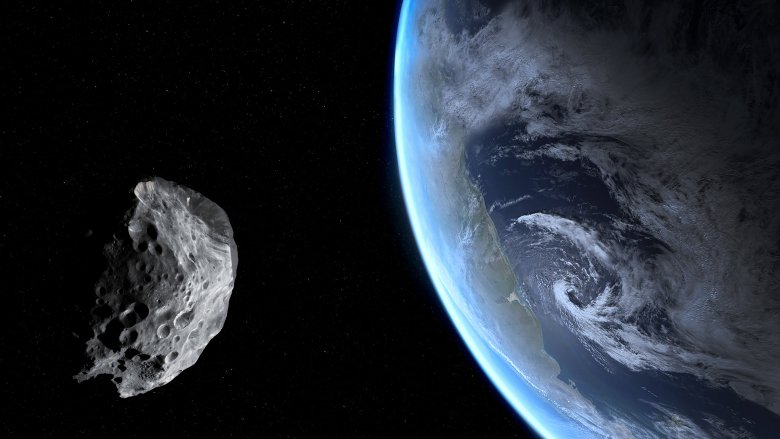What Would Happen If An Asteroid Hit Earth?
Pop culture throws out some fairly fruit-loopy notions when it comes to space. We get that it's large, cold, and threatening, but that could just as easily describe a giant squid or a prototypical great aunt. Setting our space pop-fear aside, what's the real scoop on asteroids? Here's what astronomers have to say about what would actually happen if a chunk of space rock hit our cozy home planet.
First, the reassuring news: we're working on it. As described in a 2019 Live Science article, the European Space Agency and NASA coordinate a global, biannual asteroid preparedness drill where they run simulations of what would happen if an asteroid were approaching Earth (you can learn more about the exercise and its findings on the ESA website). With each new scenario, we're getting better at knowing what space-rock nasties are out there, and what to do about it. To quote Rüdiger Jehn, head of ESA Planetary Defence: "The first step in protecting our planet is knowing what's out there."
Now, small asteroids collide with our planet's atmosphere all the time. Most are burned up completely, thanks to friction produced by air resistance. Some, however, do make it through. Here's a recent example, covered by Earthly Universe. In 2018, a 10 foot asteroid designated "2018 LA" crashed through the atmosphere over South Africa and Botswana, causing multiple explosions and shockwaves as fragments of space rock slammed into the ground. Scary for sure — but ultimately it was a minor incident.
But what if the asteroid were larger? In 1908, a huge meteor (the word for an asteroid that enters our atmosphere) collided with the Earth in a remote part of Siberia. According to NASA Science, 800 square miles of forest were instantly reduced to matchwood. The energy released by the impact was equivalent to 185 Hiroshima bombs, the air super-heating to over 40,000 degrees Fahrenheit. This hunk of space rock's size was estimated at between 160 and 620 feet, depending on its trajectory.
Then there's the worst case scenario. Let's say the asteroid is 10km across. In this case, Ask an Astronomer paints a dire picture. With a truly gargantuan asteroid bearing down on our blue planet, the protective effect of our atmosphere would be like taking a novelty plastic knife to a very real gun fight. The asteroid would smack through the atmosphere as though it were nothing. It would vaporize on impact and the blast would set our atmosphere alight, burning away much of our oxygen, and crispy baking every living organism not safely burrowed far underground. Dust would surround the earth, blocking all sunlight for at least a year. Put simply, an asteroid of this magnitude is a planet-buster. While one of these cosmic brutes killed off the dinosaurs after landing in modern-day Mexico 65 million years ago, the chances of an asteroid this size striking Earth in our species' lifetime is extremely remote.
We live in an unpredictable solar system, but when it comes to predicting what might happen if a space-rock collides with earth, size definitely matters. A small meteorite might create a few cool booms and do some minor damage. A huge meteorite could cause a mass extinction event. The latter scenario, however, is extremely unlikely.
